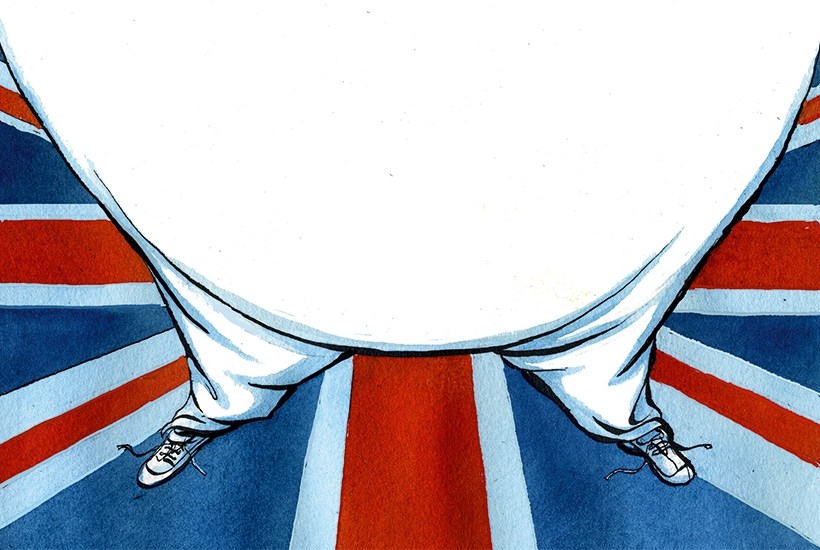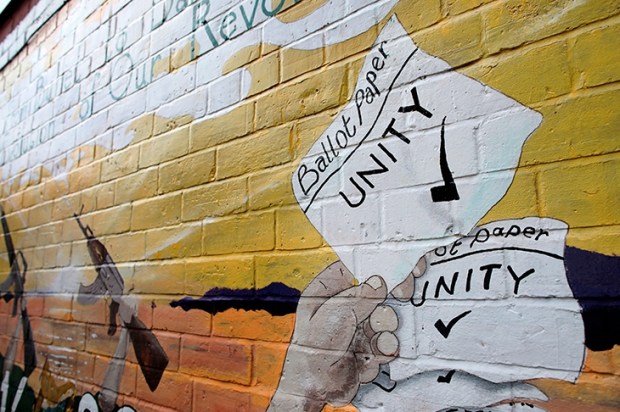In the UK’s capital city, where do the fewest obese people live? North London. The most? East London. The weight disparity between largely white and largely immigrant residents might seem to concern race, but I will argue — against the tide, as right now everything is about race — that, deep down, the fat differential isn’t ethnic.
The American and British media have chided for months about higher Covid fatality rates among minorities, and I’ve previously cast medical dubiety on the fashionable claim that these patients are dying of racism. Released last month, a statistically meticulous Columbia University study of some 7,000 cases validates my scepticism. As the New York Times reported: ‘The study did not find race or ethnicity to be an independent risk factor. The researchers did find extreme obesity to be a strong independent risk factor for worse outcomes.’ Indeed, when isolated from conditions like diabetes that corpulence can trigger, obesity alone raises the likelihood of a dire Covid response by fostering inflammation and breathing difficulties.
The crucial variable isn’t race. It’s fat. Patients with ‘extreme obesity’ — a BMI of 40 or more — were almost three times more likely to die from Covid than people of normal weight. Those with a BMI of 45 or more were four times more likely to die. And poundage is as perilous for young people as for the over-60s.
The cross-Atlantic correlation between weight and ethnicity is awkward. A staggering 42 per cent of all Americans are obese (9 per cent extremely so) — the same figure as for the white majority. The prevalence of obesity among blacks is nearly 50 per cent; among Hispanics, 45 per cent; among (mostly East) Asians, only 17 per cent.
After three hours of digging online, I can only conclude that the British breakdown of adult obesity by race is a closely held state secret. UK obesity rates are only widely available under the combined category of ‘overweight and obese’, whose greater breadth would have a levelling effect: countrywide, about 62 per cent; black, 74 per cent; white British, 63 per cent; (mostly South) Asian, 57 per cent — and South Asians apparently suffer size-related ill health at lower weights than whites; Chinese, 35 per cent. I can at least verify that in Britain black and Pakistani women are especially prone to wider waistlines, so if you’ve reached the same quiet conclusion anecdotally it’s not because you’re a bigot. At least not only because you’re a bigot.
In both countries, why are blacks especially so heavy? When bringing themselves to allude to this phenomenon at all, condescending liberal commentators bend over backwards to remove personal agency from ‘living with the burden of obesity’ (while themselves eagerly embracing fads like the 5:2 diet), as if the ‘privileged’ dump fat on unsuspecting minority neighbourhoods through an underhanded scheme of corporeal fly-tipping. Yet many popular external explanations don’t wash.
The problem is not ‘food deserts’, where shops don’t sell greens. The NHS would never want this secret out, but you could credibly thrive on chips and fried chicken so long as you called it quits after a couple of drumsticks and chucked the rest in the fridge. Weight-wise, quantity matters more than quality.
The problem is not poverty per se. Healthy food is not necessarily expensive. Broccoli in the UK costs 50p, an enormous cauliflower a couple of quid. I cook, and my regular shop consistently costs less than the trolleyful ahead mounded with ready meals.
The problem is not poor health education. A ten-year-old of any colour has figured out that pizza makes you fat and lettuce doesn’t.
The problem is not poor English, because lettuce is low-calorie in any language, and anyone who hasn’t understood the ceaseless, impotent, hectoring directives from the mercifully defunct Public Health England has been lucky.
In the UK, the problem is not lack of access to health care, because we have the ‘free’ NHS, an institution so helpless in the face of rising obesity that GPs are now reduced to ‘prescribing’ bicycles.
I lost my older brother to the complications of obesity, and while writing my subsequent 2013 novel Big Brother I gave fat a lot of thought. I don’t believe this is a racial problem. It’s a class problem. Those obesity figures for white Americans and white Britons disguise a profound subdivide. However ironically, given how much face-stuffing the well-off could afford, most successful whites eat less than struggling whites, just as they’re also far less likely to smoke. In the West, most successful people from any background are under-prone to overeat.
Granted, I over-generalise. Nevertheless, one key to success is developing a capacity for delayed gratification. You do your homework before you play. Affluent professionals enjoy eating ice cream as much as anybody. But an attractive, healthy body is a form of human capital. To refrain from polishing off the Häagen-Dazs is to protect your wealth in a larger sense. It’s an investment in your future.
Among whites and non-whites alike stuck on a social stratum that cultivates low expectations, overeating constitutes a refusal to invest in a future in which this cohort has little faith. My broke, demoralised brother ate out of hopelessness. There’s no reason to protect ‘human capital’ that’s buying you nothing. If the future looks dim, it makes perfect sense to indulge in immediate gratification, because the kebab sitting on that takeaway wrapper is the only kind of gratification you’re apt to see. This is not, I repeat not, a character failing. It’s a sign of rationality.
Oh, other factors pertain — like cultural norms, not only within minority communities, but across the board in both countries, whose cultures have reconfigured the human proportions now considered ordinary. In the American Midwest, for example, chunky has become simply what people look like. Yet at core this issue still seems teleological. It’s fun to eat, and it’s way more fun to eat carrot cake than carrots. To refrain from forking all that cream-cheese icing, you need a long-range goal that’s more important than pleasure in the present. Too many people don’t have one.
Got something to add? Join the discussion and comment below.
Get 10 issues for just $10
Subscribe to The Spectator Australia today for the next 10 magazine issues, plus full online access, for just $10.
You might disagree with half of it, but you’ll enjoy reading all of it. Try your first month for free, then just $2 a week for the remainder of your first year.















Comments
Don't miss out
Join the conversation with other Spectator Australia readers. Subscribe to leave a comment.
SUBSCRIBEAlready a subscriber? Log in